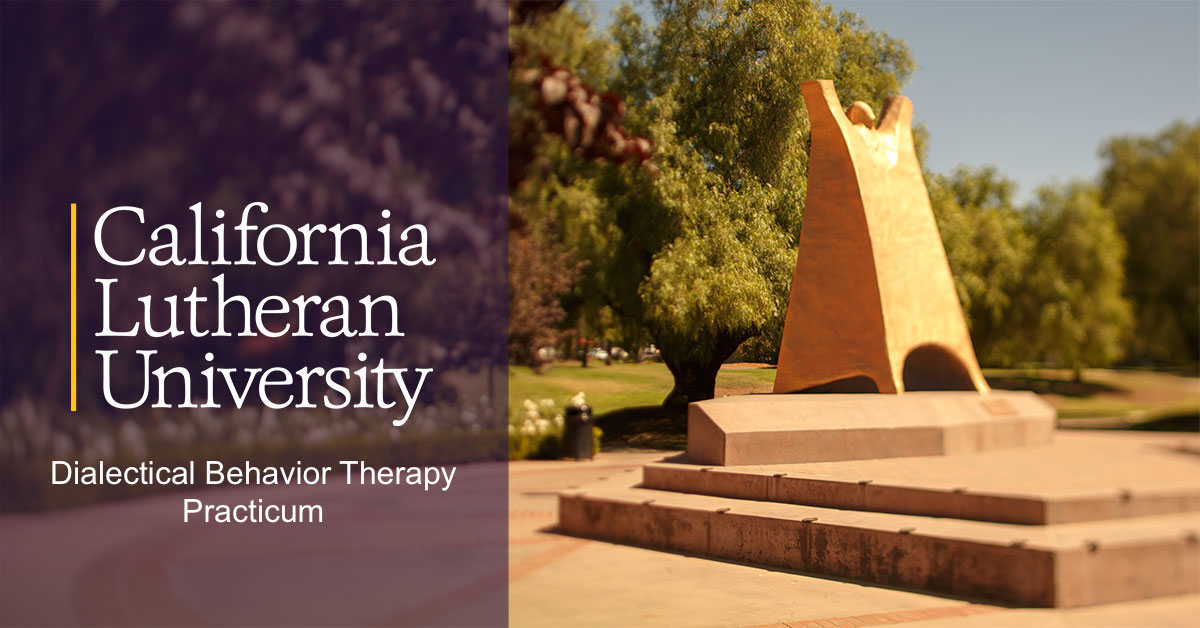DBT Practicum Handbook At California Lutheran University
2021-05-16
Overview

Welcome to DBT at CLU!
History
The DBT practicum at California Lutheran University (CLU) began in 2010 which was also the inaugural year of the PSYD Program at CLU. The training program was developed by Dr. Jamie Bedics and in collaboration with the developer of DBT, Dr. Marsha Linehan.
The goal of the DBT training program is to provide doctoral students with the coursework and training necessary to become competent providers of DBT in the community. Such intensive training in DBT during graduate school is unique. The majority of DBT practitioners in the community receive their training post-licensure through groups such as Behavioral Tech. Although these trainings represent the gold standard in DBT training for post-licensure clinicians, they are both costly and time consuming.
Dr. Linehan recognized the limitations of post-licensure training and received a training grant from the National Institute of Mental Health (NIMH) to develop methods for disseminating DBT at the graduate level. The result was the packaging of her coursework at the University of Washington (Behavioral Methods, DBT Basics, Suicide Risk Assessment and Management, and Mindfulness) to be delivered and shared by her former students and colleagues. Cal Lutheran was one of the first universities to implement this DBT training model with Dr. Bedics as the trainer and instructor.
Learning DBT at CLU
- DBT Practicum
Interested students typically take the DBT practicum with Dr. Bedics in their second year at CLU. Although called the “DBT Practicum” it is rare for students to gain exposure to comprehensive DBT and all the modalities of DBT. Instead, the majority of students are applying behavioral therapy consistent with that described in the core DBT manual (Linehan, 1993). Students can, however, expect to see clients who meet criteria for borderline personality disorder and struggle with suicidal behavior.
Responsibilities include:
1. Shadow Dr. Bedics as he conducts phone screenings and diagnostic assessments for the DBT Clinic
2. Participate in DBT Skills Training Class with Dr. Bedics as co-leader
3. Watch videos of Dr. Bedics conducting DBT skills class
4. Participate on DBT Team for two-hours per week
5. Learn how to evaluate sessions as being consistent or inconsistent with DBT (i.e., rate adherence)
6. Share your personal adherence ratings with the team and show video of yourself doing therapy on team
7. Conduct phone coaching with clients consistent with DBT principles (as needed)
8. Work harder, read more, and prepare more than all your classmates in their second yearAs should be apparent, the DBT practicum requires a strong commitment. Students who are most successful are those that are passionate and invested in learning the treatment. These students make time and, consequently, make sacrifices in other areas of their lives to get the most out of the practicum. It should also be apparent that the practicum requires humility, vulnerability, and a willingness to be wrong and corrected in front of others.
- DBT Coursework
The DBT practicum offers several course electives. The availability of these courses, however, is not guaranteed as their availability may vary from year to year and based upon the curriculum as determined by the core PSYD faculty at CLU. The DBT related courses include:
1. Behavioral Therapy (required; taken during the spring of year one)
2. DBT Basics (elective; typically offered in the fall semester)
3. Suicide Assessment and Crisis Management (elective; typically offered in the spring semester)
4. Mindfulness (elective; typically every other summer)
5. DBT Skills Training (optional for auditing; no course credit available and offered in the summer for this course)Course descriptions can be found at the Cal Lutheran Website. All of the courses are offered on the Thousand Oaks campus. Student who do not take the practicum can take these electives, again, pending PSYD faculty approval and space availability.
Please note that the readings for these courses are both extensive and dense. I have done my best to minimize redundancy in readings and to limit our readings to the most essential topics. The classes will be challenging, and likely very unpleasant for you, if you do not come having clearly read and outlined the readings with questions.
Application process for the Full DBT Practicum
Students at CLU can apply for the DBT practicum during the second semester of their first year in the doctoral program. Requirements including the following:
- Approval by their academic advisor in the doctoral program to take elective courses (if offered) in their second year.
- Approval by the Director of Clinical Training in the doctoral program.
- Good academic standing.
- Successful completion of the course in Behavioral Therapy (PSYD745) with a passing grade and the following:
- Demonstrated a high degree of professionalism (e.g., being on time to class).
- Clearly engaged in the material and participated in a professional manner in the classroom.
- Demonstrated a high degree of conscientiousness in completing assignments.
- Talk to a current DBT Practicum student about the challenges and benefits of taking DBT.
- A final interview with Dr. Bedics following the applicant having met all of the above requirements and having read this manual.

